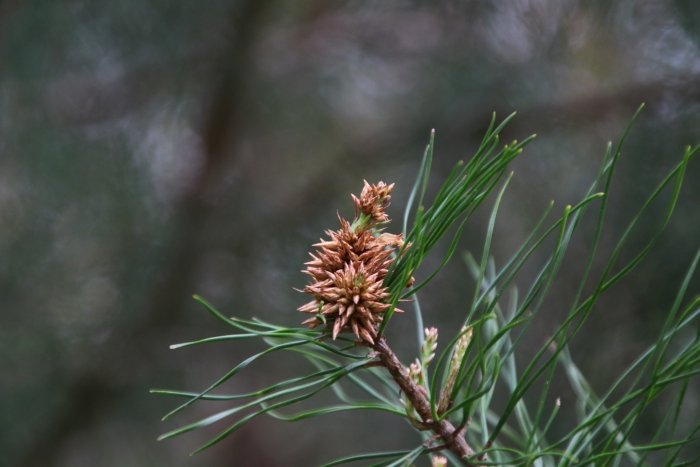Spruce Pine
(Pinus glabra)
Spruce Pine (Pinus glabra)
/
/

Lauren McLaurin
CC BY 4.0
Image By:
Lauren McLaurin
Recorded By:
Copyright:
CC BY 4.0
Copyright Notice:
Photo by: Lauren McLaurin | License Type: CC BY 4.0 | License URL: http://creativecommons.org/licenses/by/4.0/ | Rights Holder: Lauren McLaurin | Publisher: iNaturalist | Date Created: 2019-03-15T14:53:18-07:00 |















































Estimated Native Range
Summary
Pinus glabra, commonly known as Spruce Pine, is an evergreen tree native to the moist woodland areas, river terraces, and hummocks in the Southeastern United States. It is a straight-growing, medium-sized species, typically reaching heights of 65–130 feet (20–40 meters). The Spruce Pine has a slender trunk with smooth, gray bark that becomes scaly with age. Its leaves are needle-like, arranged in bundles of two, measuring 2–3 inches (5–8 cm) in length, slender (1 mm thick), and glossy dark green. The small, slender cones are 1.5–2.4 inches (4–6 cm) long, with weak prickles on the scales that are soon shed, not particularly ornamental.
Spruce Pine is valued for its adaptability to a range of soil types and its relatively fast growth rate. It is often used for reforestation projects, as a windbreak, or as an ornamental tree in large spaces due to its attractive form and foliage. It requires full sun to thrive and prefers soils with good drainage, although it can tolerate a variety of soil conditions. While it is not a true spruce, it shares some visual similarities and can serve as a substitute in warmer climates where spruces may not grow well. It is generally pest-free but can be susceptible to pine beetle infestations.CC BY-SA 4.0
Spruce Pine is valued for its adaptability to a range of soil types and its relatively fast growth rate. It is often used for reforestation projects, as a windbreak, or as an ornamental tree in large spaces due to its attractive form and foliage. It requires full sun to thrive and prefers soils with good drainage, although it can tolerate a variety of soil conditions. While it is not a true spruce, it shares some visual similarities and can serve as a substitute in warmer climates where spruces may not grow well. It is generally pest-free but can be susceptible to pine beetle infestations.CC BY-SA 4.0
Plant Description
- Plant Type: Tree
- Height: 65-125 feet
- Width: 35-60 feet
- Growth Rate: Rapid
- Flower Color: N/A
- Flowering Season: Non-Flowering
- Leaf Retention: Evergreen
Growth Requirements
- Sun: Full Sun
- Water: Medium
- Drainage: Fast, Medium
Common Uses
Bird Garden, Border Plant, Deer Resistant, Erosion Control, Fragrant, Low Maintenance, Rabbit Resistant, Street Planting
Natural Habitat
Moist woodland areas, river terraces, and hummocks
Other Names
Common Names: Cedar Pine, Poor Pine, Walter Pine, Bottom White Pine, Pin Glabre, Pin Épinette, Сосна Гладкая (Sosna Gladkaya), 光松 (Guang Song)
Scientific Names: , Pinus glabra,
GBIF Accepted Name: Pinus glabra Walter